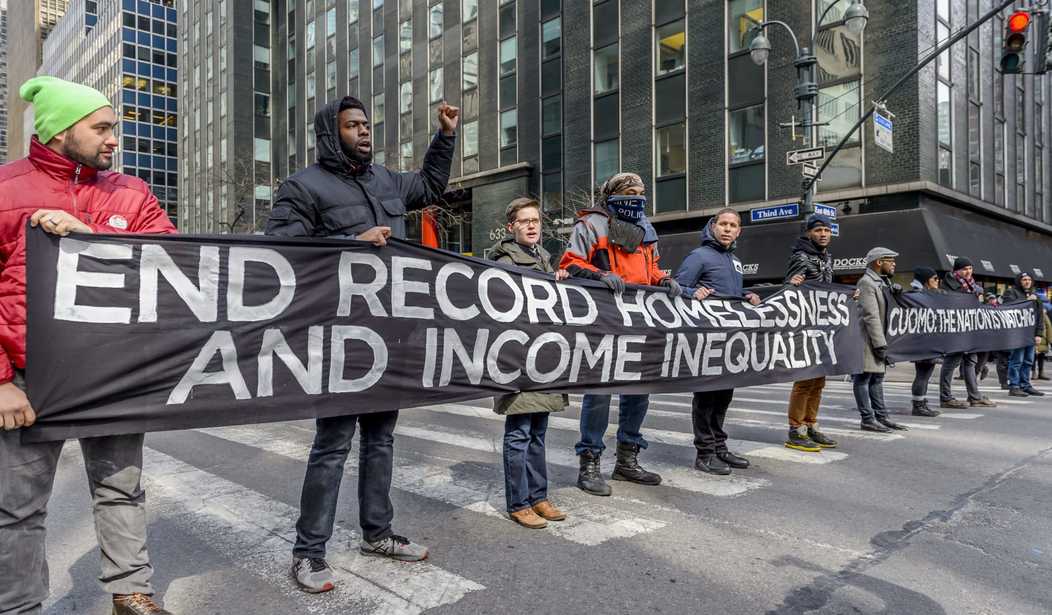New research suggests that some politicians may have been barking up the wrong tree when it comes to battling income inequality.
Take, for instance, Bernie Sanders, the former left-wing candidate for U.S. president who in 2015 said that a 90 percent top income tax rate on the wealthy would not be too high. His idea was to reduce income inequality and he cited the eye-watering tax rates as the right way to do it. Plenty in the media rushed to his defense.
The problem is that the evidence from the real world doesn’t support such assertions.
Income taxes don’t reduce income inequality. Instead they do quite the opposite, according to December-dated analysis published by the National Bureau of Economic Research.
The paper looked at three major 20th century U.S. tax reforms and found that they did nothing to decrease income inequality and everything to increase it.
“I find that all the considered tax policy reforms raised economic inequality, instead of lowering it, as was intended by the policymakers,” states the paper titled “Do Taxes Increase Economic Inequality? A Comparative Study Based on the State Personal Income Tax” by Ugo Troiano, professor of economics at the University of Michigan.
The tax policy reforms he references are the introduction of state income tax, the introduction of tax withholding along with reporting by employers, and the agreement between the federal government and the states to coordinate audits.
Why did income inequality increase when that wasn’t the goal of the reforms?
“The fact that the only effect that these reforms had in common was raising the revenues from income tax and making the government bigger and the private sector smaller, suggest that a bigger government, at least in the recent history, had the effect of higher inequality,” the report states.
In other words, bigger government ends up retarding the private sector and reducing the size of the wealth pie. Naturally, the poorer come out worst in such a situation, while the well-heeled can get top tier advice to dodge the tax bullet. Hence, the rich get richer and the poor stay skint.
One caveat that Troiano does suggest is that it is possible in each case that the labor market changed dramatically after the reforms to cause the increase in income inequality. That said, this last idea seems unlikely.
There are others who take a far more cynical view than does Troiano.
“Nobody who believes in liberty, or public choice theory, will be surprised to learn that higher taxes lead to more inequality,” says Robert E. Wright, professor of political economy at Augustana University in South Dakota.
The problem is that the elites in any society, including the U.S., control the government and they quite naturally take care of themselves first, he says. He points out that the major difference between a tin-pot dictator in a dodgy country somewhere and the U.S. republic is that the latter “has to be more clandestine” in its efforts to rig the game.
That covert approach manifests in mind-bogglingly complex tax regulations, according to Wright, a view with which anyone trying to file their tax returns now may agree.
“Income taxes laden with complex deductions are particularly good ways of quietly redistributing wealth from the middle class to the rich, which I think explains America’s outlying position in the inequality category,” he says.
The outlying position he refers to is what economists call the Gini coefficient, which measures income distribution. The higher the number (which is always between one and zero), the more unequal. The U.S. figure is high relative to other rich countries such as those in Europe.
What is notable is that states with no income tax, such as Alaska and New Hampshire, tend to have lower Gini coefficients than those with higher state income tax rates, such as New York and Massachusetts, according to data from the World Atlas website.
“That’s hardly coincidental if Troiano is correct,” says Wright.
What’s perhaps more notable is that if Sanders and his ilk wish to lower inequality of income, maybe they should think about scrapping income taxes altogether.









Join the conversation as a VIP Member